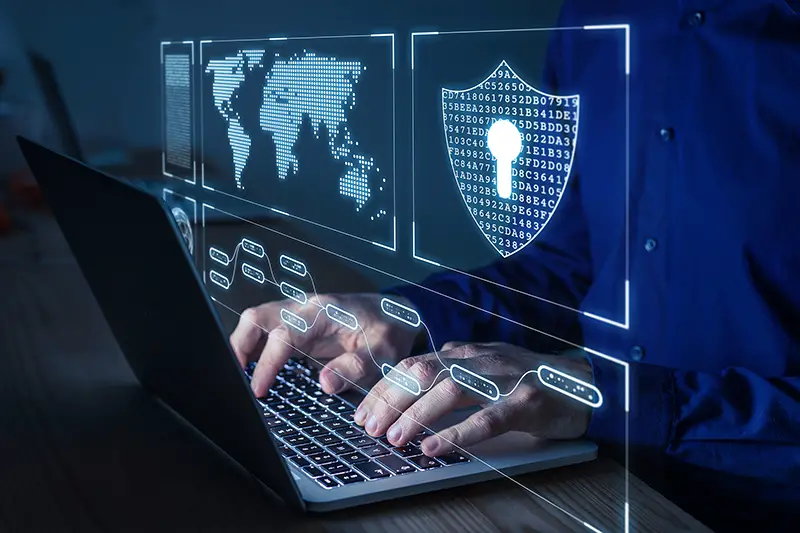Click here to get this post in PDF
With the world digitizing at the speed of light, the term “cybersecurity” has become a household one. What is it, why is it so important, and which businesses have the biggest responsibility?
What is cybersecurity?
Cybersecurity is the protection of everything online, such as computers, programs, networks and data. Strong protection against attacks on the internet is essential. In the US alone, there are roughly 90 000 monthly cybercrime attacks.
For individuals, it’s essential to have secure passwords, be wary of suspicious links and email attachments, and don’t believe everything the prince of a far-off country tells you. In a world where everything happens online, from photo albums to reading newspapers and banking – neglecting cybersecurity could leave you in a world of hurt. One could easily find themselves in identity theft, extortion attempts or loss of important private data.
Types of threats
Those operating outside the law find new clever ways to attack, but there are seven main attacks as of right now:
Password attacks
If a cyber attacker gets a hold of your password, they gain access to a wealth of information.
Malware
Software such as spyware, viruses and worms designed to gain access to a computer.
Social engineering
A tactic used to trick you into delivering pieces of sensitive information
Phishing
Fraudulent emails from addresses that resemble ones you would automatically trust. Used to steal credit card numbers and login information.
Emotet
CISA (Cybersecurity and Infrastructure Security Agency) describes Emotet as “an advanced, modular banking Trojan that primarily functions as a downloader or dropper of other banking Trojans. Emotet continues to be among the most costly and destructive malware.”
Man in the middle
An attack where hackers block a two-party transaction. When the transaction is stopped they can steal the data.
Spoofing
One of the newest forms of cyber attacks that threaten banks. The attackers create a website that resembles a bank’s and trick customers to enter the login information that is stolen and used to log on to said bank’s actual site.
Where does cybersecurity matter the most?
Cybersecurity is important for everyone, especially the online banking industry. Cash is no longer king, and most of our money is digits on the internet. Cybercrimes do not only affect the customer’s assets but the bank’s as well. If a bank endures a security breach, it would likely have to spend a small fortune to retrieve stolen data or information.
Axo Finans
Axo Finans is a Nordic digital broker for personal lending and a leading fintech company. With that comes great responsibility in terms of providing impeccable cybersecurity. With a yearly revenue north of 250 MNOK, an information breach could end up costing a lot of people a lot of money.
Operating by uniquely offering customers the best possible interest rate on their loans while ensuring that the rate does not increase through Axo, they truly revolutionized the credit loan business when they burst onto the scene in 2008.
PayPal
PayPal is a payment service used all over the world. It lets its users pay for merchandise online without giving personal information to the online stores. It’s also frequently used for money transfers between friends and relatives.
In 2020, PayPal had more than 15 billion transactions. That is plenty of data to protect. PayPal uses data encryption and monitors every transaction in real-time. By monitoring and analyzing every money transfer, PayPal helps prevent fraudulent activity and wrongful transactions.
Crypto
Few things have been more polarizing than crypto currencies and NFTs* in the digital finance world over the last few years. Questions have been raised regarding the security and handling of information, although blockchain developers claim to provide even more protection than online banks do. We’re sure this discussion will continue for years to come and are excited to see what lies ahead.
*Non-fungible token – a unique data unit of digital content such as videos, songs and images.
What lies ahead?
Digitization is showing no signs of slowing down. Cybercriminals will continue to innovate in the way they try to steal information, and the online banking community will continue to try and stop them.
What’s certain is that we’ll continue to live large parts of our life online and that we will have to rely on banks and other institutions to keep us and our data safe.
You may also like:
Nearly Half of All Passwords Can Be Hacked in Less Than 60 Seconds
Why You Should Get Educated About Cybersecurity
Image source: Shutterstock.com

